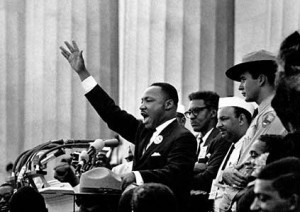Evaluating the “content of our character”
 Many of us know the epic words of Martin Luther King, Jr.'s famous "I have a dream..." speech. It's probably the most famous of the many he made on the topic of civil rights and equality, and it's the one most frequently shown on media clips. Most people know the "I have a dream..." part of the speech, but how many really know what comes after the popular soundbyte? I think, today, on the day we remember him, it's appropriate that we stop and consider the message he shared.
Many of us know the epic words of Martin Luther King, Jr.'s famous "I have a dream..." speech. It's probably the most famous of the many he made on the topic of civil rights and equality, and it's the one most frequently shown on media clips. Most people know the "I have a dream..." part of the speech, but how many really know what comes after the popular soundbyte? I think, today, on the day we remember him, it's appropriate that we stop and consider the message he shared.
I have a dream that my four little children will one day live in a nation where they will not be judged by the color of their skin, but by the content of their character.
Hopefully, we have made progress in judging based on color of skin -- although one could certainly argue that we are often as polarized by race today as we were nearly 50 years ago (but that's a topic best left for another day).
But, let's analyze the second part. If we are to be judged by the "content of [our] character," what does that mean for us today? I think it's interesting to consider what Dr. King would see, were he alive today. What has happened to our individual -- not to mention, collective -- character?
Not a day goes by where we don't hear of some scandal in the media -- sports heroes and political leaders are caught in flagrantly adulterous relationships; business leaders lie, cheat and steal their way to prosperity on the backs of unsuspecting victims. Our entitlement mentality has blossomed to such a point that for many, it's easier and preferable to remain on the government dole than it is to take any job that is offered to them. We criticize our legislators, but then fail to let our voices and votes be heard when it's time to elect new representation.
Again, as I write this, I realize that not everyone falls into this general mold. But, in today's culture, self-centeredness and selfishness is more the rule than the exception. "Character" is less valued today than it was in Dr. King's era, yet should be even more important now than ever. As we become more global, more diverse as a society and marketplace, it's increasingly important that there is some common ground where we can come together. Core principles such as mutual respect, consideration, empathy, compassion are those values that should guide us all and connect us when cultures and experiences don't. "Treating others the way we want to be treated" really isn't such a hard concept to understand; why is it so difficult, then, to practice? If we placed as much value in our moral account than we do in our bank accounts, our world would be a much different and happier place.
I've been accused of having a "Pollyanna" outlook on life before, but truly I understand how challenging it is to do right. It's not so much that I'm unrealistic or idealistic; I choose to believe in, and campaign for, the best in people. It's what motivates me to speak to groups on the importance of positive social skills and character, to consult with schools and business professionals on effective "SocialSmarts." I want people to rise out of the status quo and push themselves to be kinder, be more considerate and treat others like they matter. If I didn't think it could be done, I would have given up long ago, but I've seen enough change in those I've had the pleasure to work with that I know we have a chance.
Dr. King dedicated his work -- and his life -- to trying to change the world. While we ourselves may not have the chance to make the same sort of national or global impact, we do have the ability to make smaller, but no less significant impacts in our families and communities. If just a few people would return to a place where character mattered, over time that would influence others.
It's great that we have seen fit to honor Dr. King and his message by establishing a holiday in his memory. But, rather than just celebrate his mission and memory by hosting parades once a year, we'd do better by practicing and living the principles he preached.
---
Did you find this post interesting? Find more content on character and positive social skills by purchasing the Kindle version of "It's Not Who You Know, It's How You Treat Them" at http://www.amazon.com/Its-Know-Treat-Them-ebook/dp/B005XARZW8/ref=sr_1_2?s=digital-text&ie=UTF8&qid=1326733846&sr=1-2



